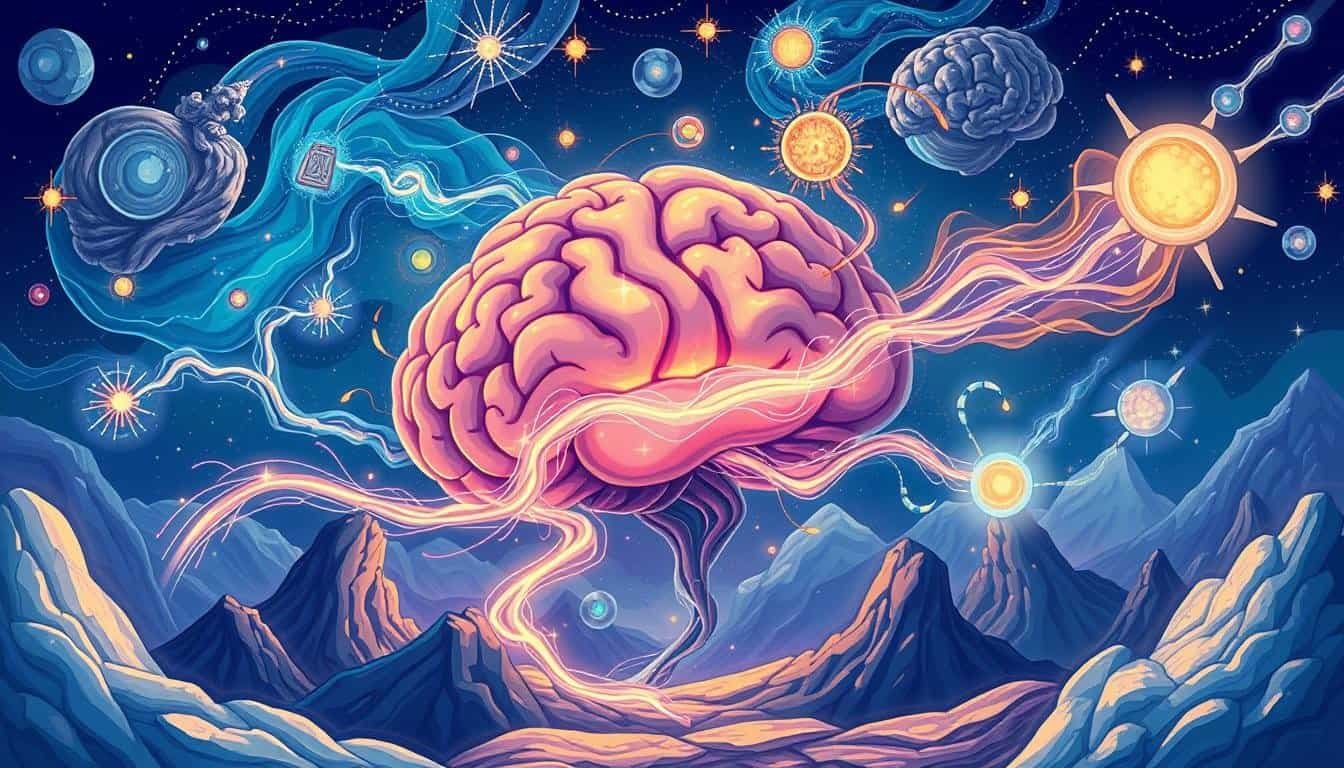The Philosophy of Mind: Understanding Consciousness
Have you ever thought about if your thoughts could exist without your brain? This question is key to the philosophy of mind. It’s about understanding how our thoughts and feelings connect to our bodies. We’ll look at how history, studies, and new ideas help us grasp our awareness and how we see the world.
Exploring consciousness goes back to ancient times. For example, Neolithic burials might show early thoughts on being aware of ourselves. The Reformation made inner truth crucial to understanding who we are. By the 1600s, thinkers like René Descartes linked thought with self-awareness, sparking debates on what makes us conscious. Later, John Locke pointed out how consciousness shapes our identity.
These early ideas led to big discoveries. G.W. Leibniz separated perception from self-awareness, and Kant tried to explain consciousness with a complex mental model. The study of consciousness picked up in the mid-1800s but slowed with behaviorism in the early 1900s. Yet, the 1980s and 90s brought a new wave of interest in the mind-body problem.
Now, we’re still discussing whether the mind is separate from the body. Some believe it is, while most think they’re connected. This debate makes us wonder: What really is consciousness, and how does it affect our lives?
Key Takeaways
- The philosophy of mind explores the link between consciousness and the body.
- Historical views have significantly influenced modern consciousness theories.
- René Descartes and John Locke were pivotal in shaping thoughts on self and identity.
- Consciousness studies saw a decline but resurged in recent decades.
- Debate continues between dualist and physicalist perspectives on consciousness.
Introduction to Consciousness
Consciousness is a complex and familiar part of being human. It’s the focus of deep discussions in consciousness studies and philosophy of mind. Philosophers have always tried to figure out what it means to be conscious and how it affects our view of truth and reality.
The study of consciousness goes back to René Descartes, who believed his thoughts were the base of all knowledge. In the 19th century, psychology became a science, leading researchers to study their own minds. Later, American psychologists Richard Nisbett and Timothy Wilson showed that people often don’t understand their own thoughts well.
Philosophers still debate consciousness a lot. They argue over what “experience” means, leading to disagreements. For example, how we feel sensations is unique to each person, making it hard to grasp consciousness fully. Ned Block and David Chalmers have pointed out the tough parts of understanding consciousness, like why we feel certain things from certain brain processes.
In the 20th century, consciousness was often ignored by psychologists who only looked at what they could see. But now, there’s a renewed interest in consciousness studies. Researchers are using new ways to study this important part of the philosophy of mind.
Looking into consciousness, we see how philosophy and science meet. This study is making us think more about our mental states and what it means to be aware and thinking.
The Nature of Consciousness
Philosophers and scientists have long sought to understand consciousness. They look at different definitions and interpretations to grasp its essence. They focus on properties like qualia, intentionality, and subjectivity to light up the complex world of human experience.
Our subjective realities greatly help us understand consciousness. They show the deep link between our minds and our experiences. This connection is key to understanding what it means to be conscious.
Defining Consciousness and its Properties
Defining consciousness is a challenge and an opportunity. Philosophers have debated its properties for a long time. They aim to find out what makes it unique.
Qualia, or the unique, subjective experiences we have, give us clues about how we see the world. Intentionality shows how our minds focus on objects, thoughts, or feelings. The subjective nature of consciousness makes it complex, as each person’s experiences are unique.
Understanding consciousness is about seeing it as more than just responses. It’s a rich mix of personal insights and experiences.
Phenomenal Qualities: What It’s Like to Be Conscious
The phenomenal qualities of consciousness show the inner richness of our experiences. They capture the unique *what it is like* feeling of being conscious. From the joy of a beautiful sunset to the calm of a quiet moment, these qualities are key to consciousness.
Philosopher Thomas Nagel said there is “something it is like” to be conscious. These subjective experiences shape how we see the world. They invite us to see the many ways consciousness shows up in our lives.
The Mind-Body Problem
The mind-body problem asks a deep question about how our mental states and physical states are connected. This question has been debated by many thinkers for centuries. They look at dualism and physicalism to understand how our consciousness relates to our brain.
Exploring Dualism vs. Physicalism
Dualism, as seen in the 17th century by thinkers like René Descartes, says the mind is separate from the body. It believes mental experiences can’t be just physical processes. On the other hand, physicalism says everything, including thoughts, can be explained by physical laws.
Today, most philosophers lean towards dualism and physicalism, with a slight edge towards physicalism. About 38% of scholars believe the mind is just the brain. This view is part of the ongoing debate.
The Explanatory Gap and its Implications
Physicalists face a big challenge in explaining how our conscious experiences come from brain activity. Dualists have their own problem, figuring out how non-physical things interact with the physical world. They struggle with ideas like original intentionality and qualia.
Philosophers like John Searle and Daniel Dennett highlight these issues. Searle talks about original intentionality, while Dennett mentions the Homuncular Fallacy. These ideas make it hard to explain how our mental states work.
This leads to a never-ending problem if each mental state needs another mind to understand it. The search for answers continues as scientists study how our actions come from our consciousness.
Theories of Consciousness
Many theories try to explain what consciousness is and how it works. Major theories aim to understand the link between being aware and thinking. This section looks at higher-order and representational theories closely.
Overview of Major Theories
Before, people mainly thought about consciousness through philosophy. Now, researchers group different views to better understand it. The main theories are:
- Higher-Order Theories (HOTs): These theories say consciousness comes from knowing your own thoughts. To be aware of a thought, you must think about that thought too.
- Global Workspace Theories (GWTs): This theory sees consciousness as a place where all information can be shared. It helps with making decisions and acting.
- Integrated Information Theory (IIT): IIT believes consciousness is about how information is combined in a system. It says consciousness can be measured.
- Re-entry and Predictive Processing Theories: These theories see consciousness as a process. They say predictions and sensory info work together to shape what we experience.
These theories add to the ongoing debate about consciousness. They give new insights that help us understand the mind better.
Higher-Order and Representational Theories
Higher-order theories focus on knowing your own thoughts and feelings. They help explain how we become aware of our mental states. This makes them important in understanding consciousness.
Representational theories link consciousness to how we see the world. They say consciousness comes from our mental pictures of the outside world. This view connects closely with how our brains work and how we see things.
As research goes on, the mix of higher-order and representational theories keeps sparking new ideas and talks. These views help us explore consciousness more deeply. They make it clearer how complex our minds are.
| Theory | Description | Key Contributors |
|---|---|---|
| Higher-Order Theories | Focus on awareness of one’s mental states for consciousness | David Rosenthal |
| Global Workspace Theory | Consciousness as a global arena for information accessibility | Bernard Baars |
| Integrated Information Theory | Consciousness linked to the integration of information | Gianfranco D’Ariano |
| Re-entry and Predictive Processing | Dynamic interaction between prediction and sensory input | Ralph Adolphs |
The Philosophy of Mind: Understanding Consciousness
The philosophy of mind is key to understanding consciousness. It looks into how our mental processes connect to our brain’s physical state. Since the mid-2000s, many studies have explored this link. They’ve given us new insights into how our minds work.
“Embodiment and the Inner Life,” a 2010 book, is a big help in this area. It mixes philosophy with ideas like global workspace theory and brain connections. This book shows us how our minds work by combining science and philosophy. A 2005 paper, “Applying Global Workspace Theory to the Frame Problem,” also shows how our brain’s architecture affects our thinking.
Cognitive science has made us understand consciousness better. It shows us the difference between feeling things and making decisions. Cognitive science has helped us see how our minds work in different ways.
Theory like First-Order Representationalism adds more to our understanding of the mind. It says that what we feel is important for our consciousness. This idea is part of ongoing debates in philosophy. These debates range from dualism to materialism, each with its own arguments.
Studies on the brain and consciousness keep pushing our knowledge forward. They help us understand what makes us different from animals. By exploring these questions, experts are helping us grasp the complex relationship between the philosophy of mind and cognitive science.
| Theories | Focus | Strengths | Limitations |
|---|---|---|---|
| Dualism | Mind and body as separate entities | Addresses the subjective nature of consciousness | Struggles with explaining interaction between mind and body |
| Materialism | Mental states as physical processes | Uses empirical evidence to support claims | Struggles to fully account for subjective experiences |
| Higher-Order Theories | Focus on mental states’ representational content | Influential in contemporary debates | May overlook unique aspects of phenomenal consciousness |
| Global Workspace Theory | Integration of cognitive processes in consciousness | Recognizes complex relationships between brain functions | Can be abstract and challenging to apply directly |
Historical Context: Evolution of Consciousness Theories
The study of consciousness has grown from ancient times to today, showing a rich history of thought. This journey helps us see how ideas have changed over time. It shapes how we think about consciousness today in both philosophy and science.
Ancient Philosophical Contributions
Early thinkers like Plato and Aristotle started exploring consciousness. Plato believed in an unseen world that shapes reality. Aristotle thought the mind was linked to the brain. These ideas started a debate on the mind and body.
Religions like Abrahamic ones added more to these discussions. They offered different views on consciousness and its link to the body.
Modern Developments in Consciousness Studies
In the early 1900s, thinkers like G.E. Moore and Bertrand Russell looked closely at perception and reality. Edmund Husserl’s work focused on our direct experiences of being conscious. Over time, ideas changed, showing us different types of consciousness.
By the 20th century’s end, ideas about physicalism changed how we see consciousness. The debate turned to how physical things can be conscious. Questions about accessing a world outside our minds became key, especially about p-consciousness and its link to the brain.
| Period | Philosophers | Key Ideas |
|---|---|---|
| Ancient Philosophy | Plato, Aristotle | Theory of forms vs. mind-body dualism |
| Medieval Philosophy | Thomas Aquinas | Interconnection of mind and body |
| Early 20th Century | G.E. Moore, Bertrand Russell, Edmund Husserl | Perception, realism, phenomenology |
| Late 20th Century | Various analytic philosophers | Shift towards physicalism and the complexity of p-consciousness |
This journey shows how our understanding of consciousness has grown. It highlights the blend of ancient and modern ideas. Today, these thoughts still shape discussions in psychology, neuroscience, and philosophy.
Consciousness Research and Scientific Approaches
Understanding consciousness is a complex task that requires insights from many sciences. Researchers look into how the brain relates to conscious experiences. They find that the link between brain states and conscious experiences is complex.
The Neural Correlates of Consciousness
Recent studies show a strong link between brain activity and conscious experience. There are many ways to look at this connection:
- Consciousness as a result of quantum processes in the brain
- Using quantum ideas to understand mental activity without focusing on the brain
- Seeing matter and consciousness as two sides of the same reality
The brain is incredibly complex, made up of networks that are influenced by many factors. It shows how quantum events and biological systems work together. Quantum events in the brain can lead to discussions about consciousness and free will, including quantum randomness, which might change how we see free will.
Cognitive Science and Consciousness
Cognitive science is key to understanding consciousness. It looks at both the science and philosophy of mental states. There are many theories and methods to explain how the brain relates to conscious experience. Some key topics include:
- The gap between the brain’s physical state and mental consciousness.
- Reductionist views that try to explain mental states fully through physical analysis.
- Non-reductionist ideas that say mental states come from complex systems and can’t be fully explained physically.
Even with progress in studying consciousness, there’s no clear agreement. Different theories are still being debated, similar to discussions in the 19th century. A mix of scientific and philosophical studies is needed to better understand consciousness. By studying how the brain and consciousness are connected, researchers hope to shed light on human awareness.
| Approach | Description |
|---|---|
| Quantum Processes | Looks at consciousness as coming from quantum events in the brain. |
| Non-Reductionism | Believes consciousness comes from complex systems that can’t be broken down to simple physical explanations. |
| Neuroscientific Correlation | Studies how brain states and consciousness are connected but doesn’t say one causes the other. |
Conclusion
We’ve explored the complex nature of consciousness and its importance in the philosophy of mind. The journey started with thinkers like René Descartes, setting the stage for today’s debates. It showed that thinking proves our existence. William James then linked psychology to understanding consciousness, highlighting the need for both deep and scientific insights.
The study of consciousness has grown, especially during the cognitive revolution. Researchers now focus on how our minds work, including attention and memory. They also tackle the mind-body problem. This focus on both explicit and implicit processes shows the importance of experiments and theories in understanding consciousness.
In wrapping up, a complete study of consciousness is key, blending philosophy with science. This approach helps us grasp the wide range of topics in cognition, identity, and human experience. The search for understanding consciousness invites both philosophers and scientists to join in this exciting field of study.
Source Links
- Consciousness
- Philosophy of mind
- Philosophy of mind – Consciousness, Dualism, Materialism
- Consciousness and Intentionality
- Progress in Understanding Consciousness? Easy and Hard Problems, and Philosophical and Empirical Perspectives – Acta Analytica
- The Nature of Consciousness
- What Is the Nature of Consciousness? | Quanta Magazine
- Brain, Mind, and Consciousness: A Conversation with Philosopher John Searle | Insights
- The mind-body problem
- The Science of Consciousness | Higher Education from Cambridge University Press
- Mind–body problem
- Seventeenth-Century Theories of Consciousness
- An Overview of the Leading Theories of Consciousness
- A Brief Overview of Popular Theories of Consciousness
- Consciousness and Philosophy of Mind
- Consciousness
- Consciousness | Internet Encyclopedia of Philosophy
- Crane Hist of Consciousness draft.pages
- The evolution of consciousness
- What Theories of Consciousness were there in the Past?
- Quantum Approaches to Consciousness
- Understanding Consciousness Goes Beyond Exploring Brain Chemistry
- Frontiers | A Map of Consciousness Studies: Questions and Approaches
- Conclusion
- Philosophy of mind | Definition, Summary, Examples, Philosophers, & Facts
- The Philosophy of Consciousness







